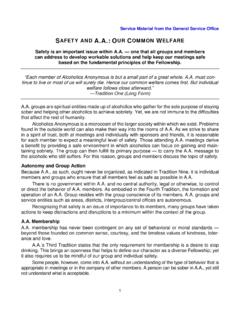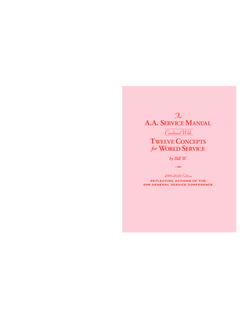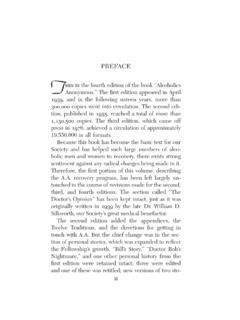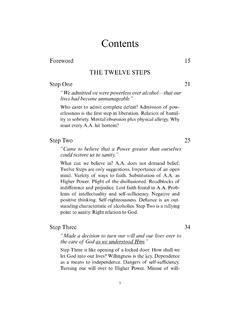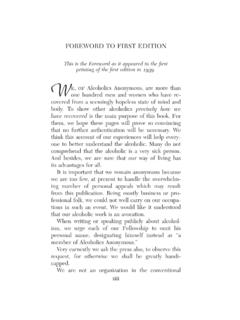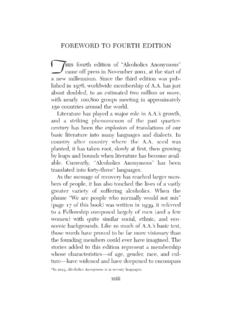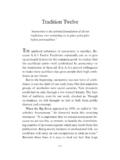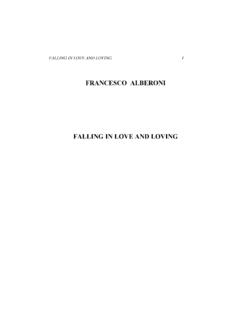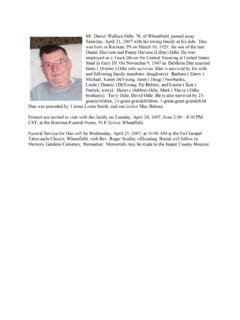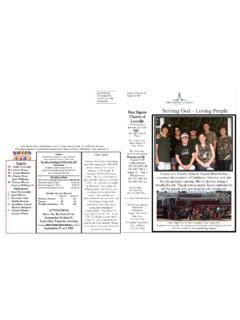Transcription of Twelve Traditions - Tradition Two - (pp. 132-138)
1 132 Tradition Two For our group purpose there is but one ultimate authority a loving God as He may express Himself in our group conscience. Our leaders are but trusted servants; they do not govern. WHERE does get its direction? Who runs it? This, too, is a puzzler for every friend and newcomer. When told that our Society has no president having authority to gov-ern it, no treasurer who can compel the payment of any dues, no board of directors who can cast an erring mem-ber into outer darkness, when indeed no can give an-other a directive and enforce obedience, our friends gasp and exclaim, This simply can t be. There must be an angle somewhere.
2 These practical folk then read Tradition Two, and learn that the sole authority in is a loving God as He may express Himself in the group conscience. They dubiously ask an experienced member if this really works. The member, sane to all appearances, immediately answers, Yes! It defi nitely does. The friends mutter that this looks vague, nebulous, pretty naive to them. Then they commence to watch us with speculative eyes, pick up a fragment of history, and soon have the solid are these facts of life which brought us to this apparently impractical principle?John Doe, a good , moves let us say to Middle-town, Alone now, he refl ects that he may not be able Tradition TWO133to stay sober, or even alive, unless he passes on to other alcoholics what was so freely given him.
3 He feels a spiri-tual and ethical compulsion, because hundreds may be suf-fering within reach of his help. Then, too, he misses his home group. He needs other alcoholics as much as they need him. He visits preachers, doctors, editors, policemen, and bartenders ..with the result that Middletown now has a group, and he is the the founder, he is at fi rst the boss. Who else could be? Very soon, though, his assumed authority to run ev-erything begins to be shared with the fi rst alcoholics he has helped. At this moment, the benign dictator becomes the chairman of a committee composed of his friends. These are the growing group s hierarchy of service self-appoint-ed, of course, because there is no other way.
4 In a matter of months, booms in founder and his friends channel spirituality to new-comers, hire halls, make hospital arrangements, and entreat their wives to brew gallons of coffee. Being on the human side, the founder and his friends may bask a little in glory. They say to one another, Perhaps it would be a good idea if we continue to keep a fi rm hand on in this town. After all, we are experienced. Besides, look at all the good we ve done these drunks. They should be grateful! True, found-ers and their friends are sometimes wiser and more humble than this. But more often at this stage they are pains now beset the group.
5 Panhandlers pan-handle. Lonely hearts pine. Problems descend like an av-alanche. Still more important, murmurs are heard in the body politic, which swell into a loud cry: Do these old- Tradition TWO134timers think they can run this group forever? Let s have an election! The founder and his friends are hurt and de-pressed. They rush from crisis to crisis and from member to member, pleading; but it s no use, the revolution is on. The group conscience is about to take comes the election. If the founder and his friends have served well, they may to their surprise be reinstat-ed for a time. If, however, they have heavily resisted the ris-ing tide of democracy, they may be summarily beached.
6 In either case, the group now has a so-called rotating commit-tee, very sharply limited in its authority. In no sense what-ever can its members govern or direct the group. They are servants. Theirs is the sometimes thankless privilege of do-ing the group s chores. Headed by the chairman, they look after public relations and arrange meetings. Their treasur-er, strictly accountable, takes money from the hat that is passed, banks it, pays the rent and other bills, and makes a regular report at business meetings. The secretary sees that literature is on the table, looks after the phone-answering service, answers the mail, and sends out notices of meet-ings.
7 Such are the simple services that enable the group to function. The committee gives no spiritual advice, judges no one s conduct, issues no orders. Every one of them may be promptly eliminated at the next election if they try this. And so they make the belated discovery that they are re-ally servants, not senators. These are universal experiences. Thus throughout does the group conscience decree the terms upon which its leaders shall brings us straight to the question Does have a real leadership? Most emphatically the answer is Yes, Tradition TWO135notwithstanding the apparent lack of it. Let s turn again to the deposed founder and his friends.
8 What becomes of them? As their grief and anxiety wear away, a subtle change begins. Ultimately, they divide into two classes known in slang as elder statesmen and bleeding deacons. The elder statesman is the one who sees the wisdom of the group s decision, who holds no resentment over his reduced status, whose judgment, fortifi ed by considerable experi-ence, is sound, and who is willing to sit quietly on the side-lines patiently awaiting developments. The bleeding deacon is one who is just as surely convinced that the group cannot get along without him, who constantly connives for reelec-tion to offi ce, and who continues to be consumed with self-pity.
9 A few hemorrhage so badly that drained of all spirit and principle they get drunk. At times the landscape seems to be littered with bleeding forms. Nearly every oldtimer in our Society has gone through this process in some degree. Happily, most of them survive and live to become elder statesmen. They become the real and per-manent leadership of Theirs is the quiet opinion, the sure knowledge and humble example that resolve a crisis. When sorely perplexed, the group inevitably turns to them for advice. They become the voice of the group conscience; in fact, these are the true voice of Alcoholics Anonymous. They do not drive by mandate; they lead by example.
10 This is the experience which has led us to the conclusion that our group conscience, well-advised by its elders, will be in the long run wiser than any single was only three years old, an event occurred demonstrating this principle. One of the fi rst members of Tradition , entirely contrary to his own desires, was obliged to conform to group opinion. Here is the story in his words. One day I was doing a Twelfth Step job at a hospital in New York. The proprietor, Charlie, summoned me to his of-fi ce. Bill, he said, I think it s a shame that you are fi nancial-ly so hard up. All around you these drunks are getting well and making money.

